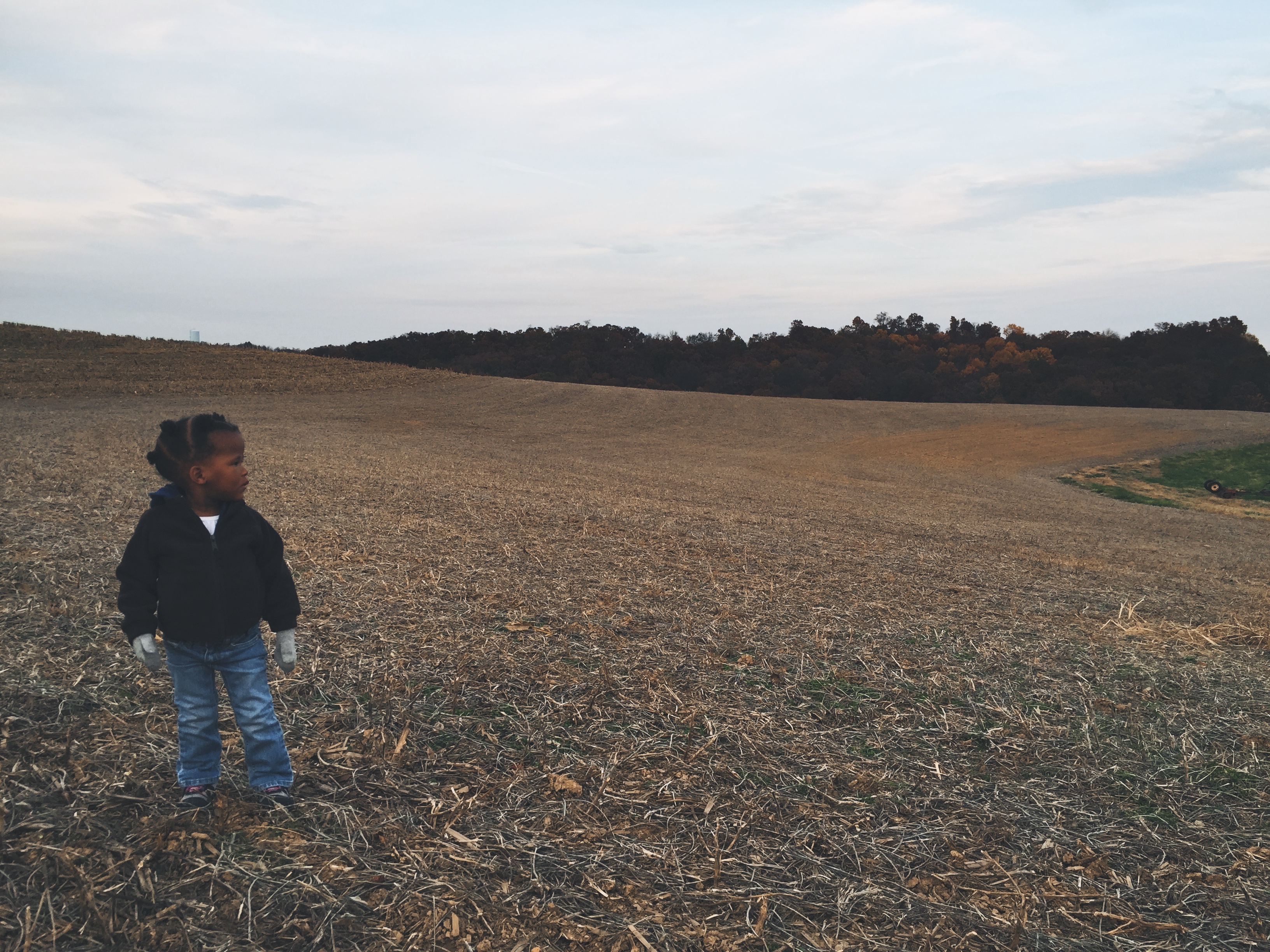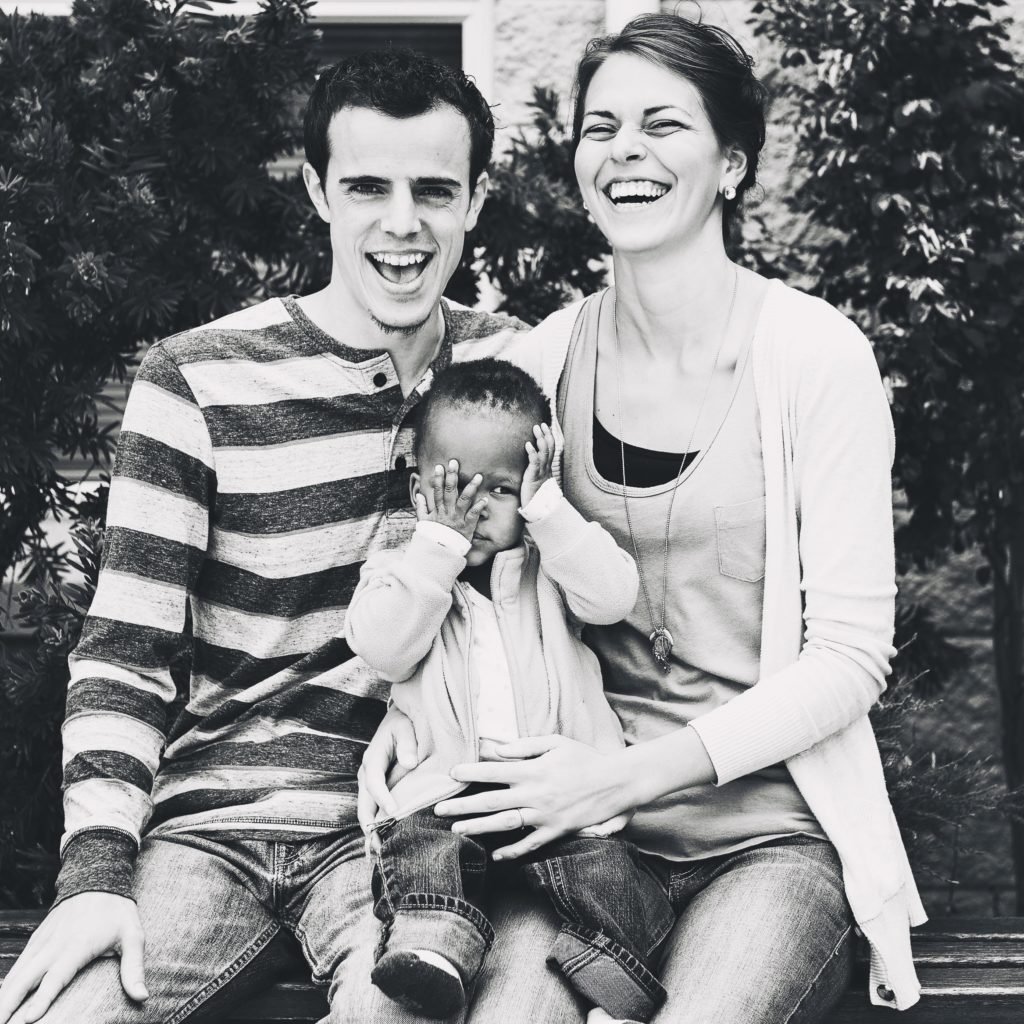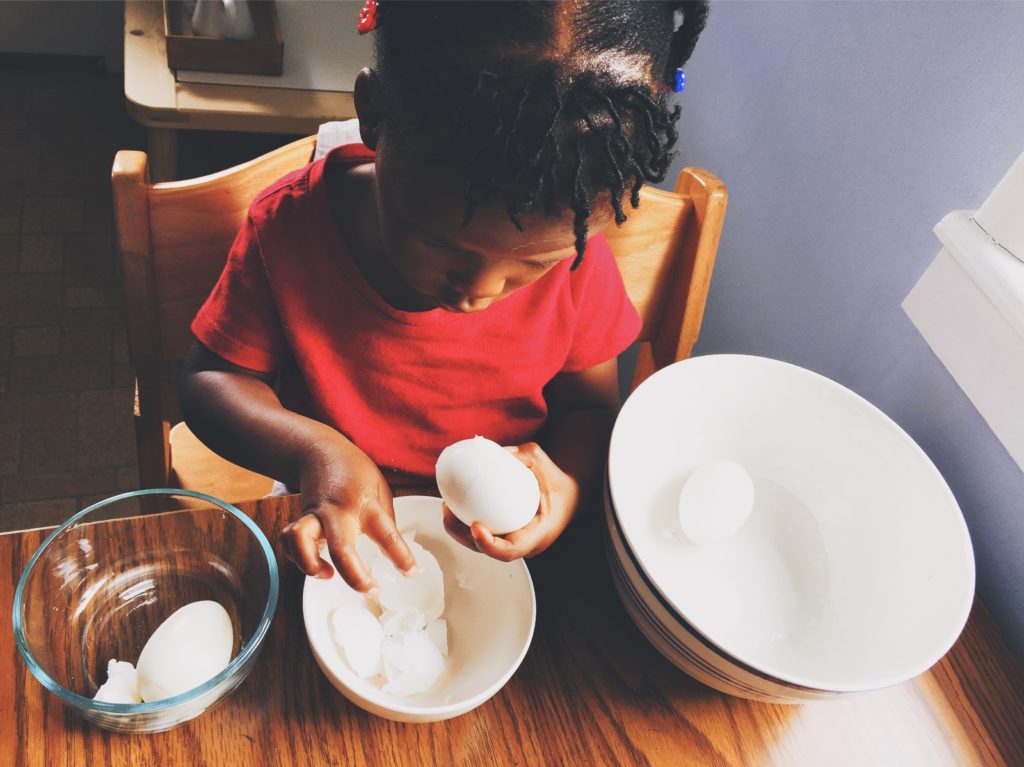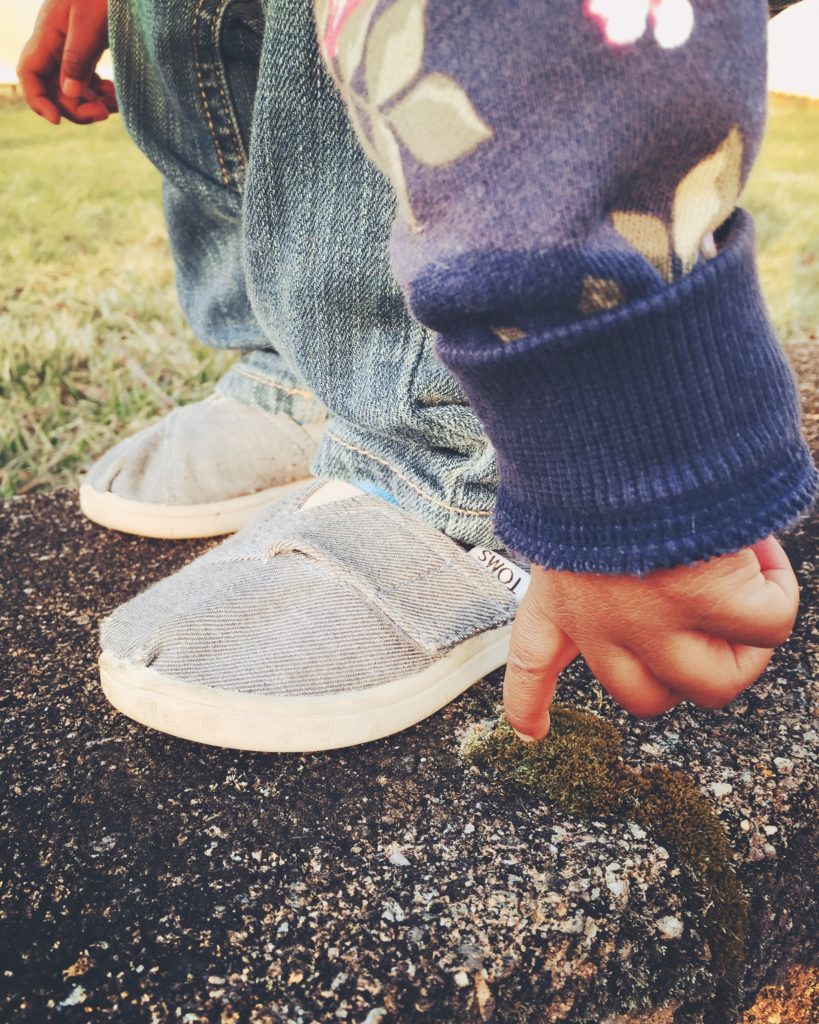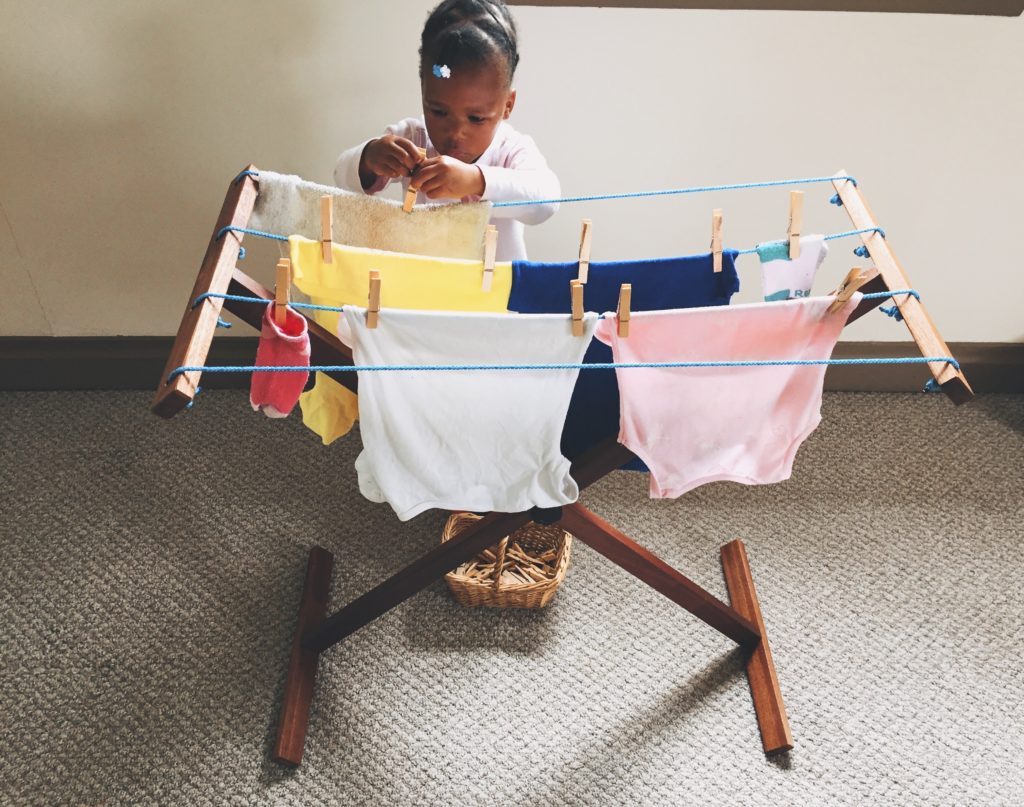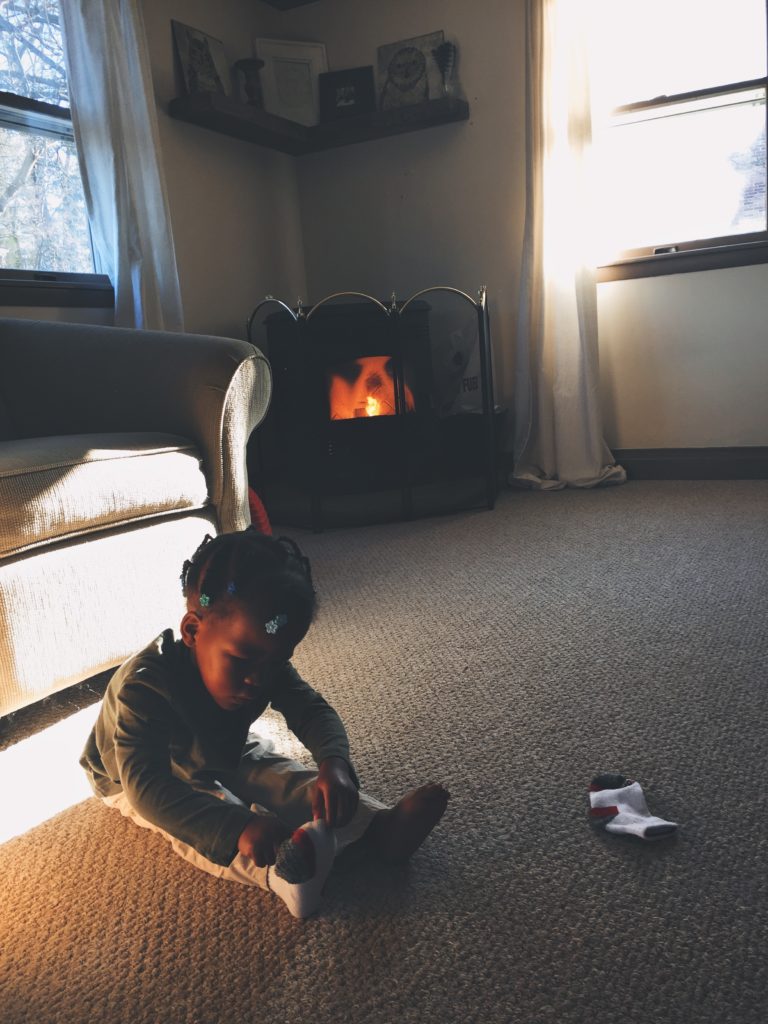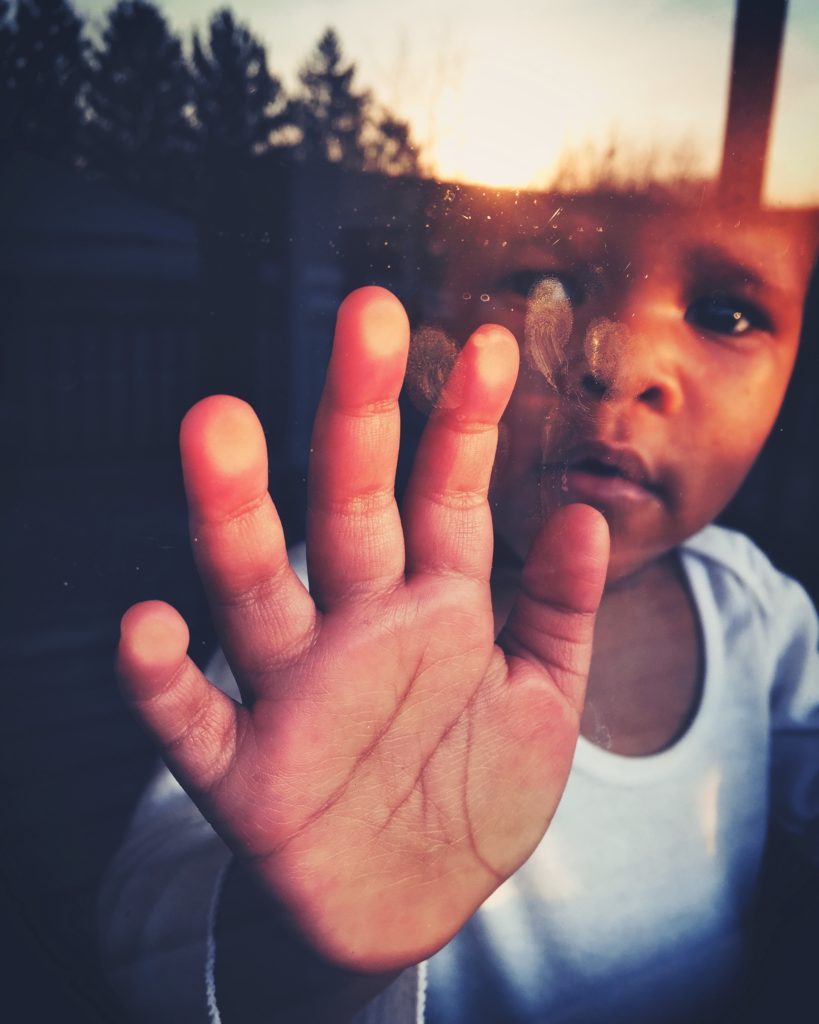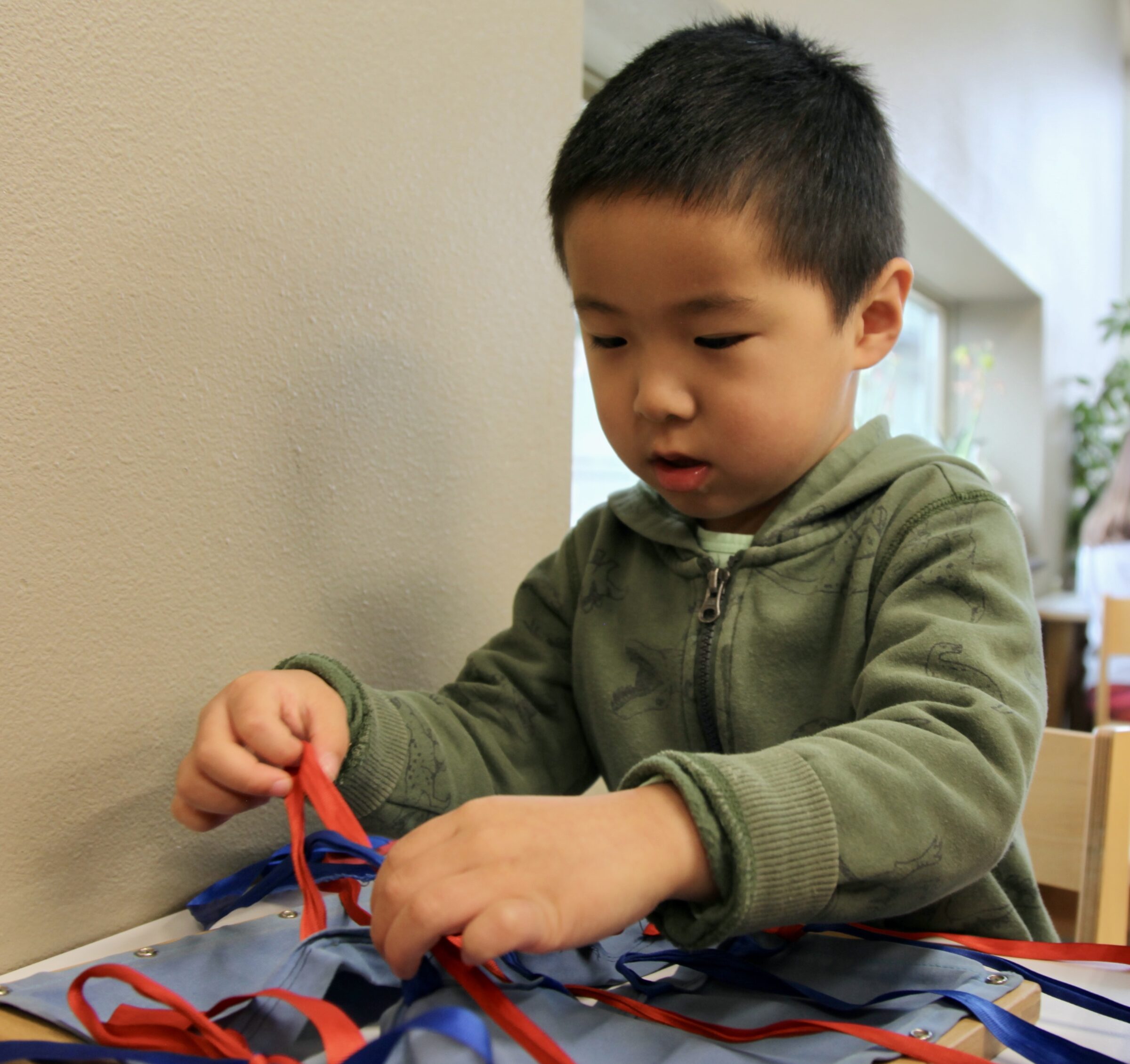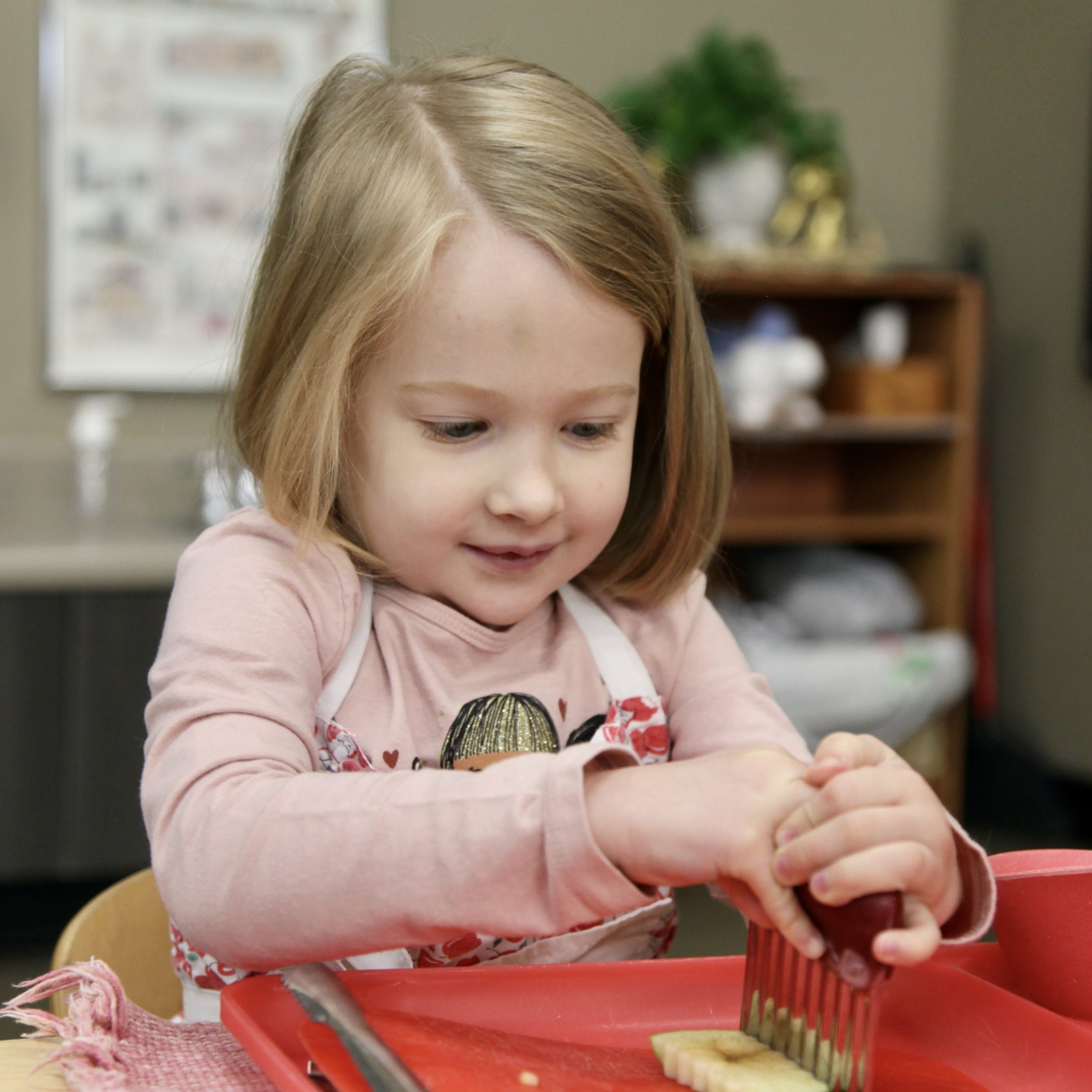Spotlight Our Montesstory
Spotlights
This time, we’re Spotlighting a new Montessori parent, who blogs over at Our Montesstory, Lindsay Grosh. Her interview is eloquent, and her passion is clear throughout. We think you’ll love her story as much as we did.
Q: Can you tell us a little bit about yourself? Your background, your interests, your dreams?
I’ll start at the beginning because the more I learn about Montessori, the more I realize how deeply my childhood experiences have shaped the interests and dreams I have for today. I was raised on a small family dairy farm in rural Wisconsin. The pulse of the milkers, the frosty breath of curious cows, and the pungent scent of haylage are ingrained in my being. My earliest memories include picking potato bugs from the garden plants, clambering up round bales, helping in the fields, and catching tadpoles at the small stream in the pasture. My siblings and I were outside every day no matter the weather and helped with chores from the time we could carry a bucket. It was a childhood filled with the most rich and diverse sensory experiences I could’ve asked for.
“The more we implemented Montessori into our home, the more I became convinced that this was the path for our family.”
Fast forward to my mid-twenties, through a university experience, a move to Pennsylvania, marriage to my husband, a few odd jobs in the both the education and veterinary fields, and finally three years of teaching second grade. My husband and I decided to grow our family through international adoption, and, in late 2015, we travelled to South Africa to meet our daughter, Natalie (now 3). 2016 saw us back in the United States as new parents to a 20 month old with special medical needs. We were utterly and completely lost. At first, we relied on the professionals, doctors and therapists, to guide us. If they suggested an appointment or new weekly therapy, we did it. But after a few months, it was clear that a lot of what we were doing wasn’t working for Natalie. She was often pushed to meet developmental milestones, provided with activities and materials to work with but not permitted to explore them first, and hushed when she showed emotions of objection, frustration, or uncertainty. We began looking for solutions that would respect both her emotional history and her needs for the future. We found Montessori.
The more we implemented Montessori into our home, the more I became convinced that this was the path for our family. Developmental delays, trauma history, and racism were (and still are) high on our radars, but generally dismissed or misunderstood in our social circles. Yet, the Montessori community exuded understanding, encouragement, and education in all of these areas. Where many suggested we should discourage emotional meltdowns, Montessori said to allow freedom of expression and try to understand it. Where racially biased remarks were dismissed as not “our” problem, Montessori is firmly grounded in peace and cultural education. For Christmas, my husband gifted me with a Montessori Toddler E-Course. Receiving education on the science behind the Montessori method, learning to properly observe, and being encouraged to get creative when promoting independence despite Natalie’s special needs radically changed our parenting. It was the last nudge we needed to commit our home to being a Montessori home.
When I have spare time in the warm months, I do a good bit of reading, preferably outside under a tree. When the weather turns cold, I make regular spare time to pursue falconry. The routine outings with my red-tailed hawk keep me linked to my wild and free childhood, the bite of frost on my cheeks as I watch nature unfold before me.
And my dreams? Oh, I have so many… building and managing a beef herd, riding my own horse again, flying my dream bird of prey, the goshawk, trying beekeeping, blogging as an actual job, supporting other adoptive families, starting a Montessori home group, educating others about childhood trauma, moving to a rural area with nearby streams, forests and fields, bringing our future children home… But, I’ll stop there because, when I think about it, I have lived a lot of my dreams in some form. Farming, falconry, blogging, adoption, and Montessori have all been a part of my life. And for that, I can be thankful and content.
Q: Now that the hardest question is out of the way: What’s your favorite color?
Would it surprise you if I said “green”?
Q: Do you have a favorite book? How about a film?
Oh, dear. I don’t know that I have a favorite book. I’m fairly certain that everything I’ve read has left it’s mark on me. If pressed, today I might say Upside Down: Understanding and Supporting Attachment in Adoptive Families. But tomorrow I might decide that Pride and Prejudice or The Count of Monte Cristo are the favorites. And film… I’d have to say Inception. The soundtrack gets me every time.
Q: When you close your eyes late at night, and imagine waking up and starting a new adventure: what is that adventure?
I sometimes dream of returning to South Africa as a family to start a foster home, similar to the one Natalie spent time in, to be family to children without families. Rehoming to another country would be an adventure in itself, but to integrate Montessori principles in working with children from hard places… to show them they are worthy, safe, and respected… that would be a privilege and a joy.
Q: What first appealed to you about Montessori?
The respect for the child as a whole person. Natalie is a highly sensitive person, so being shuffled from one therapy activity to the next, being discouraged from exploring materials for the sake of time, and adults touching her without her permission is emotionally challenging for her. Yet, it was taken as the norm in most therapy situations and around adults. When we found Montessori, we felt like “Ah. Here is a way of life that respects the challenges our child has faced but also respects that she is capable of developing herself and becoming more than her challenges.”
Q: What advice do you have for new Montessori adults?
Speaking to new Montessori families, whether that be parents, grandparents, aunts or uncles: you don’t have to “get it” all at once. Montessori is an unfamiliar concept in most circles, and trusting a child with so much of their own developmental journey can be scary especially if you’re used to being in charge and having control when it comes to children. Try trusting the child in one or two areas by providing them freedom within safe boundaries and seeing how you both feel. I think you’ll be amazed to find that you’re willing and eager to trust them in other areas as time goes on.
“It was at that point that I realized the power of the child, the power to overcome great obstacles if only adults would provide what is necessary and then move out of the way.”
Q: Did you have a “Montessori Moment?”
I think I have Montessori moments often. But I still remember my first. We had decided to try to implement Montessori in the home, knowing in actuality very little about the method as a whole. N had been assessed as being extremely delayed in her self-care skills, still unable to even independently drink from an open cup at 24 months. We talked about moving from a straw cup, to a no-spill cup, to a regular cup, but it didn’t sit well with us. We knew Natalie was capable of drinking independently. We just didn’t know how to get her there. We weren’t aware at the time, but we were too much in her way, worrying over spills and if her speech delay would also be affected by our choices. I don’t remember why anymore, but we decided to start with pouring water from a pitcher to a glass. Big step, I know. After each meal, we set the pitcher with a small amount of water and the tiny glass in front of her, stepped back, and determined not to step in even if she looked as if she would spill or break something. Within one week, she was drinking from an open glass without spilling a drop (often) and pouring it independently to boot! I couldn’t believe it. It was at that point that I realized the power of the child, the power to overcome great obstacles if only adults would provide what is necessary and then move out of the way.
Q: What’s your favorite Montessori quote?
Hmmm… I use a lot of them to help guide me through the days with my daughter. But the one that makes my heart swell with hope and my eyes grow misty is this: “The child is capable of developing and giving us tangible proof of the possibility of a better humanity. He has shown us the true process of construction of the human being. We have seen children totally change as they acquire a love for things and as their sense of order, discipline, and self-control develops within them… The child is both a hope and a promise for mankind.”
Q: What inspired you to share your Montessori story on your blog?
I’ve always been a writer at heart. (So much so, that my original career plan was to become a high school Language Arts teacher so I could share my passion with students.) When 2017 rolled around, I decided that I would use a blog as an outlet for my non-stop processing about either adoption or Montessori. Either way, something needed to get out of my head. I hesitated, though, fearing I would have nothing of value to share. One evening, while perusing a few different Montessori blogs, it hit me. Several of these bloggers are parents, simply sharing their Montessori experiences, ideas, and journeys with authenticity and respect for their children. That’s something I could do. I might not have the perfect environment or materials, and what led me to Montessori might not be typical, but it didn’t matter. Montessori transcends all of that, accessible to anyone willing to follow, truly follow, a child’s development. I felt that I could help other parents interested in Montessori see that accessibility by sharing my early experiences.
Q: What advice do you have for new parents trying to incorporate Montessori at home?
I would say that it’s easy, in your exuberance, to go on a shopping spree and buy all of the materials you see other Montessori children using. Try not to get caught up in the materials as your first step. Look around your home and think about what adjustments you can make based on what you already have to make your child feel like a welcome and valued member of the family. Focus on fostering your child’s independence and concentration. We often want a concrete way to control our children’s success, and materials tend to give us that false security. But the magic of Montessori really begins when you believe that your child is fully capable of developing those characteristics we desire for them, if only we would provide opportunity and then let them.
Q: What do you think is the best introduction to Montessori?
Seeing it for yourself. I remember, after I read all of the blogs I could get my hands on, I moved to Youtube videos. When that didn’t sate my thirst, I started looking for schools I could visit. I was graciously given the opportunity to observe both a 3-6 and a 6-12 class. Having been an elementary teacher in a traditional school setting, what I saw there was enough to make my jaw drop. Students were working with great focus, despite my presence. Those who chose to work in pairs were doing so without disrupting others and without bickering. The vast majority were working independently. And all on different things! I felt I had good classroom management as a teacher, but for all of this to happen at once in my classroom would have been… a great rarity. And that’s a generous estimate.
“I might not have the perfect environment or materials, and what led me to Montessori might not be typical, but it didn’t matter. Montessori transcends all of that, accessible to anyone willing to follow, truly follow, a child’s development.”
While I wish I had had more opportunities to see Montessori in action before I implemented it (I would have liked to have observed an toddler community, for example), there was nothing quite like seeing the changes it made in my home. So, though I don’t necessarily think jumping in headfirst is the best introduction to Montessori, I will say that I wouldn’t have truly been introduced without experiencing it firsthand with the people I live with and know best.
Q: What continues to inspire you about Montessori?
I’m continually inspired that Montessori can be for any child. Every child. Regardless of culture, physical challenges, developmental differences, and individual interests. Because the Montessori anthem is essentially “follow the child”, we celebrate the development of the child instead of rushing toward the milestone. We savor the journey as much as the destination. There’s no pressure, no emphasis on what a child can’t do yet. Rather, the value is placed on what the child can do and what they are doing to develop themselves.
Q: In what ways do you envision the future of education?
I’d like to see teaching to the test, meeting benchmarks, and “cookie cutter” or “one-size-fits-all” education discarded. Watching children strive to meet standards and learning goals set by adults and stifling their internally driven developmental urges is heartbreaking. As an elementary teacher, I saw that, was part of it, all too often. Children shouldn’t be reaching “full potential” as defined by someone else. That’s actually quite limiting. Education should free them to reach their own internally and individually defined potential.Of course, I’d envision Montessori schools becoming widely accessible as a way to offer this freedom.
“Because each child is a unique individual, following the child is complex and ever-shifting.”
I also really like the idea of apprenticeships becoming mainstream as a way for young adults to transition into the workplace towards the end of their school years. So many young adults are trying to enter the workforce armed with degrees and a whole lotta head knowledge. It can be frustrating because they’ve done everything that they have been told to do, only to find out that they can’t find a job because they don’t have experience (a Catch-22 dilemma, there) or because employers are looking for qualities that can’t be taught in a university. I can’t help but wonder if, when these young adults were children, they had been able to develop their problem-solving, independent thinking, and drive to develop themselves they would be in this position. The qualities employers are looking for would already have been internalized as children. They wouldn’t be waiting for someone to tell them what to do to be successful. They would define success for themselves and then find a way to get there. Shouldn’t our education be preparing children for that?
Q: Where do you see Montessori in the next 100 years?
I’ve only been in the Montessori world for a year now, so to think 100 years out seems so… beyond me. I generally learn pretty quickly and make connections easily, so I’ve discovered so much since beginning our Montessori journey. But it makes me all the more aware of the sheer amount I have yet to learn and understand. Because each child is a unique individual, following the child is complex and ever-shifting. It makes sense to me that the method would remain unchanged, an anchor for the adults. In addition, our world seems to be in a constant state of change as well. So I hope Montessori doesn’t change a whole lot in the next 100 years. We could use a bit more stability to lean on in this world.
Written by:
Charlotte Snyder
